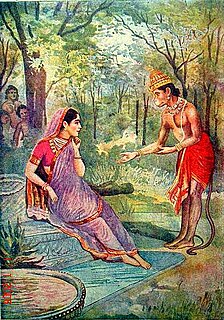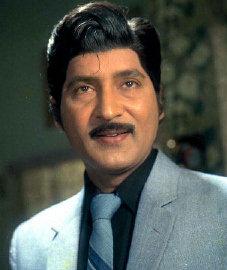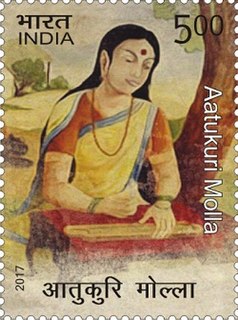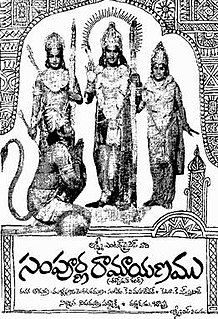
Krishnankoil Venkadachalam Mahadevan was an Indian composer, singer-songwriter, music producer, and musician known for his works in Tamil cinema, Telugu cinema, Kannada cinema, and Malayalam cinema. He is best known for his contributions in works such as Manchi Manasulu (1962), Lava Kusa (1963), Thiruvilaiyadal (1965), Saraswathi Sabatham (1966), Kandan Karunai (1967), Thillana Mohanambal (1968), Adimai Penn (1969), Balaraju Katha (1970), Athiparasakthi (1971), Sankarabharanam (1979), Saptapadi (1981), Sirivennela (1986), Sruthilayalu (1987), Pelli Pustakam (1991), and Swathi Kiranam (1992).

Sattiraju Lakshmi Narayana, known professionally as Bapu, was an Indian film director, painter, illustrator, cartoonist, screenwriter, music artist, and designer known for his works in Telugu cinema, and bollywood. In 2013, he was awarded the Padma Shri, for his contribution to Indian art and cinema.

Samarla Venkata Ranga Rao, popularly known as S.V.R., was an Indian film actor, director and producer known for his works in Telugu cinema and Tamil cinema. Regarded as one of the finest method actors in the history of cinema and one of the greatest actors in Telugu Cinema, Rao was popularly known as "Viswa Nata Chakravarthi". Throughout his film career, which spanned a total of thirty years, Rao garnered various National Honors, International Honors, State Nandi Awards, and the Filmfare Special Award - South. In 1951, Rao appeared in the fantasy film, Pathala Bhairavi, screened at the first India International Film Festival, held in Mumbai on 24 January 1952. Rao received wide reception for his portrayal of Nepala Manthrikudu the tantric in the super-hit film.

Sundara Kaanda, is the fifth book in the Hindu epic, the Ramayana. The original Sundara Kanda is in Sanskrit and was composed by Valmiki, who was the first to scripturally record the Ramayana. Sundara Kanda is the only chapter of the Ramayana in which the hero is not Rama, but rather Hanuman. The work depicts the adventures of Hanuman and his selflessness, strength, and devotion to Rama are emphasized in the text. Hanuman was fondly called “Sundara” by his mother Anjani and Sage Valmiki chose this name over others as the Sundara Kanda is about Hanuman's journey to Lanka.

Sobhan Babu was an Indian film actor known for his works exclusively in Telugu cinema. He made his film debut in Bhakta Shabari (1959), but Daivabalam (1959), was released earlier at the box office. Sobhan babu has garnered five state Nandi Awards for Best Actor, and four Filmfare Awards for Best Telugu Actor.

Atukuri Molla (1440–1530) was a Telugu poet who authored the Telugu-language Ramayana. Identified by her caste, she was popularly known as Kummara (potter) Molla. Mollamamba or Molla was the daughter of Kesana Setti who was a potter by profession. That they belonged to the bayya community. Earlier historians placed her as a contemporary of Tikkana Somayaji during the times of Kakatiya empire. But, Kandukuri Veeresalingam Pantulu in his ‘Andhra Kavula Charitra’ points out that she was a contemporary of Sri Krishna Deva Raya, disproving the earlier claims that she was the sister of Kummara Gurunatha who was the scribe of Tikkana Somayaji in translating Mahabharata. Her salutations to poets like Srinatha who lived in the periods between the Kakatiya and Vijayanagara empires point out that they predated her.

Lava Kusa is a 1963 Indian Telugu-Tamil bilingual Hindu mythological film directed by C. S. Rao and his father C. Pullaiah. The film's script was written by Samudrala Raghavacharya. The film was produced by Shankar Reddy under Lalita Sivajyothi films. The film was shot in both Telugu and Tamil languages with the same title, but with slight differences in the cast. The film was a remake of 1934 film of same name which was also directed by C. Pullaiah. The story is an adaptation of the Uttara Kanda from Ramayana. It revolves around the roles of Lava and Kusa, sons of Rama and Seetha. The Telugu version stars Kanta Rao, Shoban Babu, S. Varalakshmi, Kaikala Satyanarayana in supporting roles, replaced in that order by M. R. Radha and Manorama in the Tamil counterpart.

Depending on the methods of counting, as many as three hundred versions of the Indian epic poem, the Ramayana, are known to exist. The oldest version is generally recognized to be the Sanskrit version attributed to the sage Narada, the Mula Ramayana. Narada passed on the knowledge to Valmiki, who authored Valmiki Ramayana, the present oldest available version of Ramayana.
Ramayana is one of the two major Sanskrit epics of ancient India.
Chandrakala was an Indian film actress who appeared in Telugu, Kannada, Tamil, Malayalam and Hindi films.

Sampoorna Ramayana is a 1961 Hindi language Indian historical film directed by Babubhai Mistry, based on the Hindu epic Ramayana by Valmiki, starring Mahipal and Anita Guha as Rama and Sita respectively. The film was a box office hit, and became a milestone in the history of Hindu mythology. It was the second significant Hindi film based on Rama, after Vijay Bhatt's hugely popular Ram Rajya (1943). Babubhai, known for his special effects throughout his career, made extensive use of effects to enhance dramatics. The film also made lead actor Anita Guha, who played the role of Sita, a household name. Lata Mangeshkar sang two of the most top-class semi-classical songs in this movie, namely "San Sanan, Sanan, Sanana, Ja Re O Pawan" and "Badalon Barso Nayan Ki Or Se", which are still very popular.

Sampoorna Ramayanam is a 1971 Telugu-language Hindu mythological film directed by Bapu. It is based on Valmiki's Ramayanam. It was a commercial hit.

Sampoorna Ramayanam is a 1958 Tamil-language Indian historical drama film directed by K. Somu. It is based on Valmiki's Ramayana. The film features N. T. Rama Rao in lead role of Rama and Sivaji Ganesan as Bharatha. The film, produced by M. A. Venu, had musical score by K. V. Mahadevan and was released on 14 April 1958. It became a major commercial success, and ran for over 264 days in theatres, thereby becoming a silver jubilee film. It was dubbed into Hindi as Ramayan in 1960.
Pudipeddi Jogeswara Sarma also known as P. J. Sarma was an Indian film dubbing artist, turned actor and writer, known for his works predominantly in Telugu cinema and a few Tamil and Kannada films. He has worked for over 500 films as an actor and dubbing artist. He is the father of actors Sai Kumar, P. Ravi Shankar and Ayyappa P. Sharma.

Mikkilineni Radhakrishna Murthy was an Indian film actor and thespian known for his works predominantly in Telugu cinema. He was the founder of the theater group Praja Natya Mandali. He has received the honorary Kalaprapoorna from Andhra University, for his contributions towards Telugu theater and cinema.

Mudhalali is Muktha Srinivasan's 1957 Tamil directorial debut. This drama film was produced by M. A. Venu under M. A. V. Pictures. The movie stars S. S. Rajendran and debutante Devika in the lead roles, while M. N. Rajam, A. Kannaiyan and T. P. Muthulakshmi play in supporting roles. The film's soundtrack and background score were composed by K. V. Mahadevan, while the lyrics for the songs were written by Ka. Mu. Sheriff.

Idolle Ramayana, shot simultaneusly in Telugu as Mana Oori Ramayanam is a 2016 Indian Kannada-language comedy-drama film directed by Prakash Raj. The film was produced by Prakash himself with Ramjee Narasiman under Prakash Raj Productions and First Copy Pictures. The film is a remake of 2012 Malayalam film Shutter with Jogi and Raman Gopisetti writing the dialogues for both versions simultaneously.
Aanand Vardhan is a Telugu film actor who, as a child artist, appeared in more than 20 Telugu films.

Pennarasi is a Tamil film released in 1955 with A. P. Nagarajan and P. Kannamba in the lead roles.
Anil Malnad was an Indian editor who worked in over 200 film across Telugu, Tamil and Odia languages. He won the National Film Award for Best Editing for the Telugu film Sitaara (1984).












